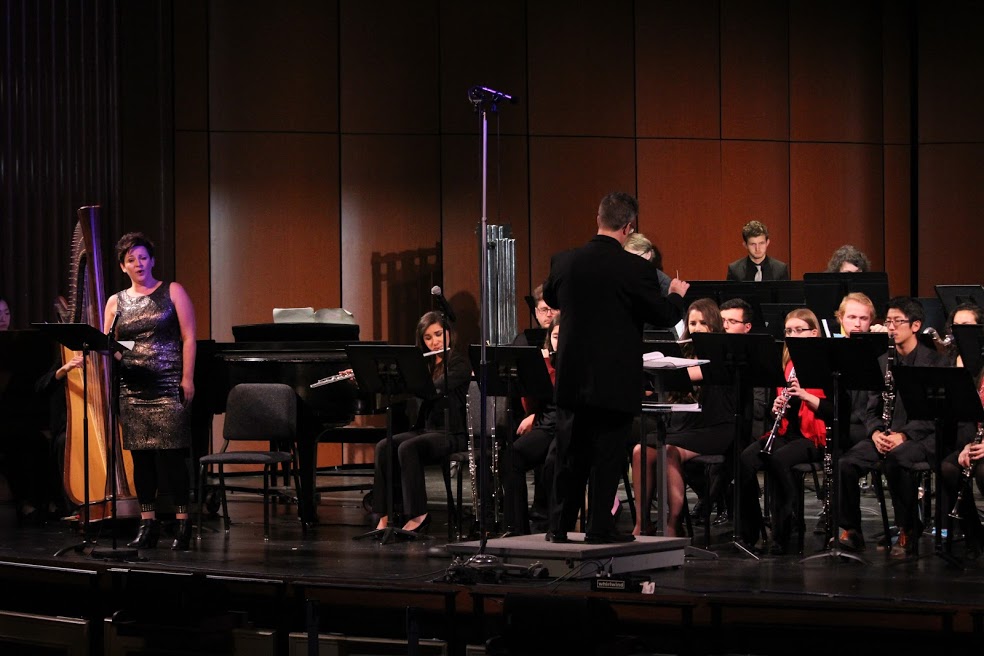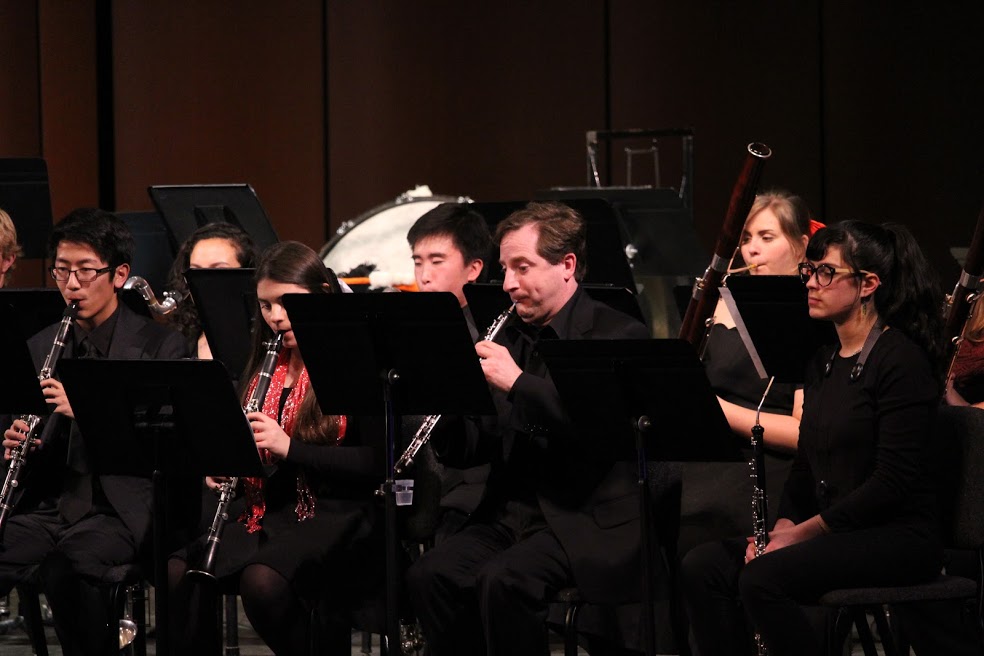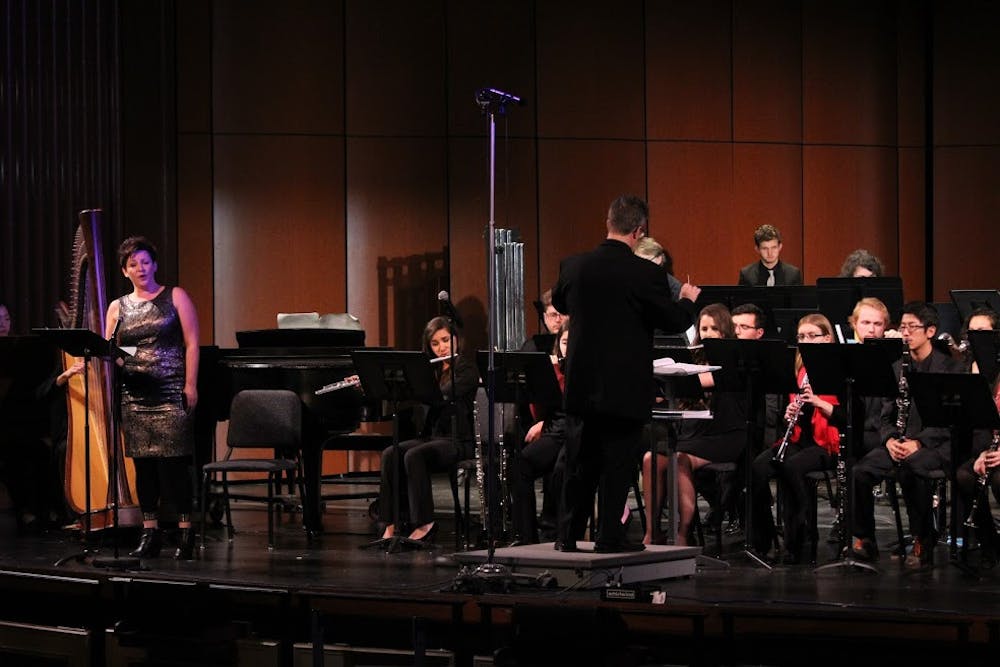By George Tatoris
Sports Editor
“I have one pair of assless chaps,” Mellissa Hughes sang to a crowd at Kendall Hall on Friday, Nov. 11. “Size 42. Perfect condition, barely noticeable stickiness.”
That night, the stage belonged to the College’s Wind Ensemble for their concert, titled “Word/Play.” Hughes first came to campus in 2015 for the College’s “Katrina Ballads,” a song cycle about Hurricane Katrina on the 10th anniversary of the disaster.
This time, Hughes came to sing about about assless chaps. The band provided color with chromatic scales on the xylophone and oompahs from the brasses, giving the song a fitting comical context.

The song was one of eight in “Craigslistlieder,” a piano and vocal composition by musician Gabriel Kahane, arranged for the Wind Ensemble by its director, David Vickerman, and with a libretto written by a series of anonymous ad posters on Craigslist. The song cycle was the centerpiece of the concert that night.
“What I love about it is that it takes something so basic — we’ve all read Craigslist ads — we’ve all read something basic like this, and then putting this really well-crafted music behind it,” Vickerman said. “And then really making the music honest to what it’s about… (the music is) what it would sound like if you were really writing that.”
The individual who penned “For Trade: Assless Chaps,” wanted Spider-Man comics “or equivalent,” in return.
The arrangement by Vickerman added an operatic flair to these common man’s plights, and Hughes was able to morph her voice to fit each ad’s tone. Vickerman described the feat as “athletic.”
In “Half a Box of Condoms,” Hughes laments as she discovers “five blue, foil squares,” at the bottom of her sock drawer that are soon to expire, even though she is soon to be deployed. She anguishes over what could have been.
In “Neurotic and Lonely…” she plays the part of an “occasionally employed anthropologist, chainsmoking Jew,” who yearns for love, but has a long list of prerequisites for his potential lady. When the narrator is describing himself, the band utilizes chaotic rhythms and avant-garde stylings to stress the neuroticism of the man’s ad, but shifts to a quiet hymn when describing a potential Mrs. Right.
“Seeks gorgeous artsy genius woman interested in philosophical discourse,” Hughes sang.
The band swells as Hughes sings the final and most important requirements of the writer: “No Ugg boots. No Long Island.”
Hughes poured saccharine on her vocal chords for “If Anyone Knows,” a Disney-like ballad about one Craigslist user’s search for a mysterious condiment found at a stand in the Catskills.
“Somewhere up there at one of those stands, we pulled over and bought some stuff,” Hughes sang.
“Bought some stuff,” the Wind Ensemble sang in refrain.
The crowd laughed, and was able to chime in for the next line.
“One of the things we bought was some kind of sandwich relish,” Hughes sang.
“Sandwich relish,” the crowd sang.
For Vickerman, this was desirous.
“To me, concerts are about bringing people together,” Vickerman said. “And when we separate (the audience) from what we’re doing, it doesn’t help that.”
It’s not common for a sing-along to break out while a wind ensemble plays — it’s against concert etiquette — but Vickerman encouraged the rebellious attitude. During an intermission between the first and second songs of the night, he told the crowd to react to the music however they saw fit.
“Clap whenever you want,” he said.

After playing through an entire composition the crowd finally broke character for “If Anyone Knows.”
The band opened with Osvaldo Golijov’s “Three Songs for Soprano,” a series of dream-like compositions set to poems about death and mourning, and moved onto Louis Andriessen’s hectic arrangement, “M is for Man, Music, Mozart.” The only thing binding the three was the need for a soprano, and what Vickerman described as “the interplay of language and music.”
“There wasn’t anything really deep,” Vickerman said. “There were some deep moments maybe, but most of it’s just pretty fun and joyful.”
“Night of the Flying Horses,” the first of Golijov’s “Songs,” opened with a solo from Hughes. Soon the band joined in, providing sparse instrumentation driven by a rhythmically plucked harp. Meanwhile, a purple light provided color to the stage while the band played slow, sweeping notes.
In the last two minutes, the band broke into a gallop, propelled by a snare roll that sounded like a freight train.
The light turned blue for the next song, “Lúa Descolorida,” or “colorless moon” in Galician, making the stage look like a cloudless night on a full moon. Hughes opened the song with a wordless howl.
While Hughes sang lyrics that encapsulated absolute misery, even wishing for Death to “take my body and soul / Together / To a place I won’t be remembered,” according to the translation in the concert program, the piano and other instruments plodded behind, ascending up a scale while Hughes wailed.
For the last of the three songs, “How Slow the Wind,” written around an Emily Dickinson poem of the same name, the light turned a vibrant pink and the tone of the music made just as drastic a change. Driven by sinister low notes from the bassoon section, many of the phrases in this song went down a scale.
The band cut down in size for their next song series, “M is for Man, Music, Mozart.” Only part of brass section, a stand-up bass, a piano and Hughes remained onstage for the seven-part composition. Between each song, the band transitioned with instrumentals.
If “Craigslistlieder” was whimsical and “Three Songs for Soprano” was melancholy, this middle composition encompassed fury.
While the band hammered through dissonant chords, Hughes bellowed obscene, sometimes gory lyrics.
“‘B’ is for bile, blood and bones,” she sang during “The Alphabet Song.”
During the instrumentals, the saxes droned 16th notes to give the piece its frantic drive. The final song, “The Eisenstein Song,” mellowed things out before intermission. The band glided along on long notes while a flute echoed behind Hughes and the rest of the band.
The Wind Ensemble closed the night with “Opera Scene,” the story of one user’s search for a roommate that will tolerate the user’s one fatal flaw: their compulsion to put ice cubes down people’s shirts.
The finale of “Craigslistlieder” proved just as enjoyable as the rest.
“Let’s enjoy this together, be part of it, that’s what makes it great,” Vickerman said. “That’s what people love about live music.”







